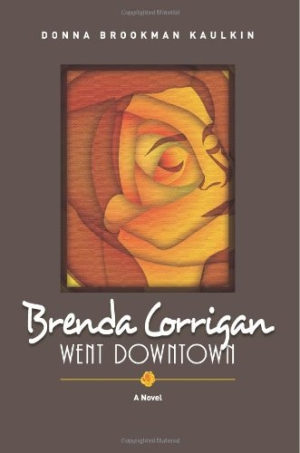Brenda Corrigan Went Downtown
Donna Brookman Kaulkin’s debut novel examines the too-little-mentioned subject of crime against older women, with emphasis on the main character’s gradual emotional and physical decline.
When Brenda Corrigan, an independent sixty-five-year-old divorcée and former Washington think-tank researcher, is raped and disfigured on a California trail, friends and family help manage her reconstructive surgeries and their aftermath. The novel moves between Brenda’s hospitalization, her past, and her struggle to reenter life under the guidance of her adult children. Brenda’s realization that she can no longer serve as “the fixer, the mender, the one who stepped in to rescue them in hard times” becomes a poignant reminder of aging and the role reversal that sometimes accompanies it.
Brenda’s quickly fragmenting self is aptly depicted on the cover of the book. With traces of cubism, the art features a rose-like pattern superimposed on a woman’s upturned face, conveying fragile repose, or, as in Brenda’s case, an initial refusal to confront new circumstances. Kaulkin’s characterization of an intelligent woman plagued by the irrevocable is equally fitting. The author touches on aspects of PTSD, creating realistic shifts between lucid resilience and regression, competence and vulnerability.
Kaulkin, who also wrote a play based on the Randall Jarrell poem “The Woman at the Washington Zoo,” uses the poem’s closing lines here (“You know what I was, / You see what I am: change me, change me!”) as Brenda’s personal cry. The burden of dealing with the aftereffects of the attack, however—including loss of the ability to eat and speak normally, unwelcome media attention, and self-blame—prevents such change.
Less successful elements are the name, dialogue, and behavior of the rapist, which border on a caricature of evil rather than on the more subtly frightening. Additionally, Brenda’s memories of her abusive father and of women raped in Rwanda during the 1990 genocide complicate rather than enhance the plot. There is also the inclusion of a romantic figure whose career as a spy offers enough material for its own story.
Despite such moments, this is a worthy rendering of trauma. Kaulkin eschews the path of brave recovery, offering a darker—and perhaps more sadly realistic—account. Secondary themes of mother-daughter relationships, friendship in later life, and loyalty round out the story. Brenda Corrigan may not inspire fellow survivors, but for general readers, the reminder that mercy comes in many forms is provocative.
Reviewed by
Karen Rigby
Disclosure: This article is not an endorsement, but a review. The publisher of this book provided free copies of the book and paid a small fee to have their book reviewed by a professional reviewer. Foreword Reviews and Clarion Reviews make no guarantee that the publisher will receive a positive review. Foreword Magazine, Inc. is disclosing this in accordance with the Federal Trade Commission’s 16 CFR, Part 255.

